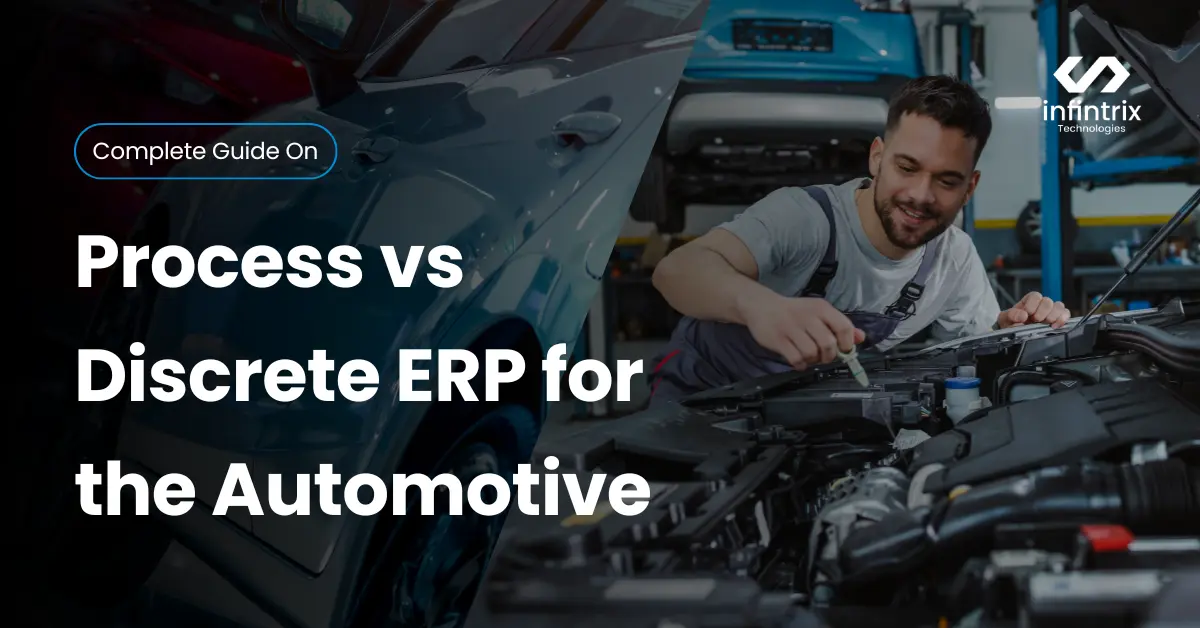When you’re managing an automotive operation, the right ERP system isn’t only another software choice—it reflects how efficiently your entire business operates. From coatings and adhesives to complex vehicle assemblies, manufacturers face difficulty in two very different worlds: process ERP and discrete ERP.
So, which one is the exact fit for your shop floor, supply chain, and compliance requirements? Let’s break through the differences, examples, and real-world scenarios to help you see where your requirements align.
Process ERP in Automotive
Process ERP is designed for those industries where goods and materials are measured in recipes or formulas rather than individual units. Think paints, lubricants, plastics, or adhesives that automotive plants depend on daily. Traceability and regulatory compliance are central, since one bad batch could disrupt the entire production line.
In practice, ERP for coatings, adhesives, and lubricants means managing recipes, monitoring quality specs, and automating regulatory reporting. You’ll also get better supply chain visibility when sourcing raw chemicals, which helps you avoid costly shortages. Here’s how it plays out in automotive operations:
- Tracking paint formulations for a consistent finish on cars.
- Monitoring rubber compounds used in tires or seals.
- Managing compliance with ISO, REACH, or NHTSA standards.
- Recording batch data for quick recalls if needed.
Discrete ERP in Automotive
Where process ERP works with fluids and formulas, discrete ERP shines in the world of parts, assemblies, and units. It’s built around the BOM (Bill of Materials), which is the backbone of everything from dashboards to EV drivetrains. Each part is traceable through serial or lot tracking.
In the ERP for automotive industry, discrete ERP handles spare parts management, warranty claims, and production scheduling across multiple lines. That’s why OEMs and Tier-1 suppliers rely on it to keep vehicles rolling off the line without a hitch. Typical applications include:
- Scheduling production lines for cars, trucks, and EVs.
- Managing dashboards, transmissions, or braking systems.
- Linking serial numbers to warranty and after-sales support.
- Tracking modular builds for growing EV startups.
Hybrid ERP Solutions
Some operations sit right in the middle. For example, a supplier may create chemical coatings (process) while also assembling brake systems (discrete). Here, a hybrid ERP setup can unify both models into one system, giving leaders full visibility without juggling multiple platforms.
The upside? Better compliance/traceability and smoother supply chain management. The downside is added cost and complexity during ERP implementation. Here’s a quick look at pros and cons:
Pros
- Unified data across formulas and BOM structures.
- Stronger compliance reporting for audits.
- Reduced silos between process and discrete teams.
Cons
- Higher upfront costs.
- Training takes longer.
- Customization is often required.
Here’s the key takeaway: if your mix leans heavily one way, stick with a specialized system. If you’re truly 50/50, then ERP for hybrid manufacturing may save you headaches long term.
ERP Vendors for Automotive
Not all ERP vendors excel in every area. Some dominate in process ERP, others in discrete ERP, and a few offer hybrid flexibility. Choosing the right partner means matching vendor strengths to your exact operational mix—whether you’re an OEM, a Tier-1 supplier, or a growing EV startup.
Here’s an ERP vendor comparison snapshot that many automotive leaders find useful:
| Vendor | Process ERP Strength | Discrete ERP Strength | Automotive Fit |
| SAP ERP automotive | Strong compliance + batch management | Global BOM support | Tier-1 & OEMs |
| Oracle ERP automotive | Moderate | Robust discrete ERP | OEM-heavy |
| Infor ERP automotive | Deep process expertise | Solid discrete support | Mid-market suppliers |
| Microsoft Dynamics ERP automotive | Add-ons needed | Flexible for discrete ops | Growing suppliers |
ERP Implementation Challenges
Rolling out a new ERP software isn’t just about features. It’s about how smoothly your people, processes, and data transition. In automotive, where downtime is expensive, ERP implementation must balance speed with accuracy. Training teams to handle both recipe/formula management and BOM tracking can be tough.
That said, the biggest challenges usually fall into three buckets:
- Data migration – Cleaning and moving years of production and compliance records.
- Change management – Getting operators, managers, and IT aligned.
- Scalability – Making sure your ERP solution grows with future EV and hybrid needs.
Quick tip: Always run a pilot before a full rollout. It’s cheaper to spot gaps early than after go-live.
ERP Benefits in Automotive Manufacturing
When done right, an automotive ERP isn’t just back-office software—it drives better outcomes across the factory floor, supply chain, and customer relationships. For example, real-time data improves production scheduling and inventory flow, while compliance modules simplify audits and warranty claims.
Key benefits include:
- Stronger supply chain management with fewer disruptions.
- Built-in compliance/traceability for ISO and NHTSA audits.
- More accurate cost tracking and forecasting.
- Faster response to quality or recall issues.
Here’s the takeaway: in a highly regulated and competitive industry, the right ERP for automotive operations pays for itself in efficiency and trust.
Compliance and ERP
For automotive leaders, compliance/traceability isn’t optional—it’s a daily reality. Whether you’re tracking coatings under REACH or verifying assemblies for NHTSA, the right ERP system for automotive makes reporting far less painful.
Process ERP covers batch traceability, while discrete ERP handles serial numbers and warranty data. Together, they create a single audit trail that regulators (and customers) can trust. This is where ERP compliance, ISO REACH, and NHTSA really show their value.
ERP for EV Production
Electric vehicle manufacturing adds another twist. Most EV startups begin with a discrete ERP to manage modular vehicle builds. Later, they often need EV/battery ERP capabilities for chemistry and material tracking, which leans on process ERP. Hybrid setups become common as companies scale.
For example, an EV plant may:
- Use BOM tracking for battery packs and drivetrains.
- Layer in recipe/formula management for electrolyte materials.
- Expand into a hybrid ERP as volume grows.
That said, EV builders should plan for ERP scalability early, so the system adapts as production and compliance needs change.
Conclusion
Choosing between process vs discrete ERP automotive isn’t about picking a side—it’s about matching software to your reality. If you’re heavy on coatings, adhesives, or plastics, lean toward process ERP. If your bread and butter is assemblies and finished vehicles, a discrete ERP will fit better. Many suppliers end up needing both.
At the end of the day, your ERP for automotive industry is the backbone of compliance, efficiency, and customer trust. The smartest move? Look beyond labels and vendor hype. Test systems against your real workflows—recipe, BOM, or hybrid—and invest in an ERP solution built for your future.
From small to mid-sized automotive manufacturing businesses, Infintrix ERP Solution is the best choice if your focus is on growing your business. Ready to explore how Infintrix ERP works for the automotive industry? Book a Free Demo today.
FAQs
What’s the main difference between process vs. discrete ERP in automotive
Process ERP is formula-driven, ideal for chemicals and coatings. Discrete ERP focuses on BOMs, parts, and assemblies. Automotive operations often overlap both.
Can one ERP system handle both process and discrete manufacturing?
Yes. Some ERP software, like SAP and Infor, offer hybrid ERP, but these setups can be costlier and more complex.
Why is ERP so critical in the automotive industry?
Because it improves supply chain management, production scheduling, compliance, and efficiency. In such a regulated space, ERP is essential for traceability and customer trust.
Which ERP is better for EV manufacturers?
Most EV startups begin with a discrete ERP for modular builds, then add process ERP for batteries and materials. A hybrid model often follows.
How do I know if I’m ready to switch ERP systems?
If you’re stuck in spreadsheets, struggling with compliance gaps, or running process and discrete data separately, it’s time to evaluate modern ERP for digital transformation in automotive.

